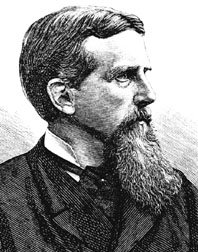

 | Page 1091 |  |
Journal of Archaeological Research 5, 4 (1997).
For studies of the role of archaeology in the construction of colonial and national identities, see B.G. Trigger, “Alternative Archaeologies: Nationalist, Colonialist, Imperialist,” Man 19 (1984); P. Kohl, “Nationalism and Archaeology,” Annual Review of Anthropology 27 (1998); contributions toG.C. Bond and A. Gilliam, eds., Social Construction of the Past: Representation as Power (London and New York: Routledge, 1994); M. Diaz-Andreu and T.C. Champion, eds., Nationalism and Archaeology in Europe (University College, London, 1996); P.L. Kohl and C. Fawcett, eds., Nationalism, Politics and the Practice of Archaeology (Cambridge: Cambridge University Press, 1995); and John A. Atkinson, Iain Banks, and Jerry O’Sullivan, eds., Nationalism and Archaeology (Glasgow: Cruithne Press, 1996).
(1844–1904)
Born in germany and educated at Munich University, Friedrich Ratzel originally studied zoology. After graduating in 1869 he spent six years traveling before returning to Munich to study for a doctorate in geography. He is one of the most important figures in the development of nineteenth-century geography, and he contributed to the development of ethnology as a separate discipline in the German-speaking world.

Friedrich Ratzel
(Science Photo)
Ratzel’s work focused on the influence of the environment on human life and on political geography. He also supported German colonialism, inventing the word lebensraum (“living space”), used later by the Nazis as a means of justifying territorial expansion in the 1920s, 1930s, and 1940s. Ratzel also coined the term “anthropogeography,” which was used during the nineteenth century to distinguish the discipline now known as human geography.
With colleagues fritz graebner, Leo Frobenius, and Wilhelm Schmidt, Ratzel founded the cultural-historical school of anthropology. His concept of a culture area (Kulturkreis) was widely used within both German and American anthropology and in describing cultural regions such as Melanesia and Mesoamerica, becoming one of the common concepts within the discipline. Ratzel taught for most of his life at the University of Leipzig and wrote about diffusion and diffusion routes, another fundamental interest of the cultural-historical school.
References
Heine-Geldein, R. 1964. “One Hundred Years of Ethnological Theory in the German-Speaking Countries: Some Milestones.” Current Anthropology 5: 407–418.
A member of the Communist Party and a theoretician, Vladislav I. Ravdonicas led the movement to create a new Marxist archaeology in the Soviet Union during the 1920s and 1930s. In a paper, “For a Soviet History of Material Culture,” Ravdonicas criticized the theoretical positions of such prominent Russian archaeologists as Aleksandr Miller and vasiliy gorodcov, which in some cases led to their being dismissed and exiled. The State Academy for the History of Material Culture, led by the Stalinist Nicolay Marr, ensured that Ravdonikas’s protégés occupied leading positions within the discipline.
 |  |